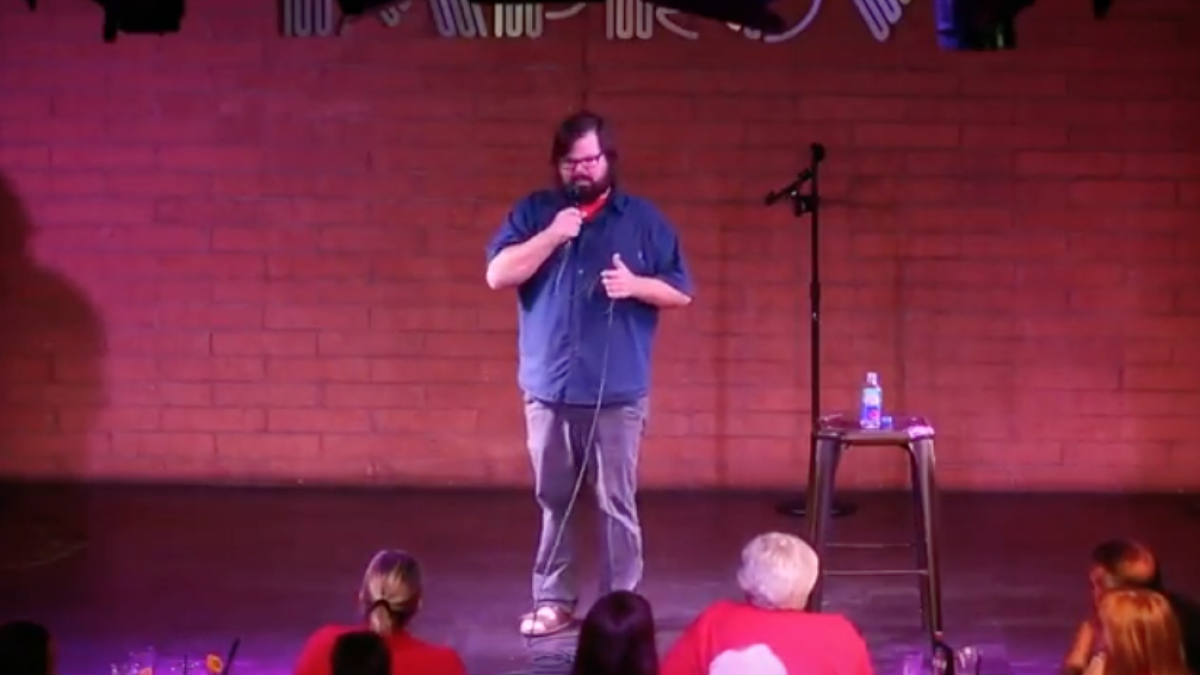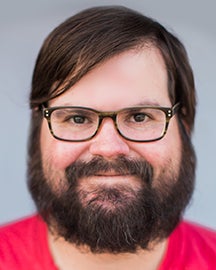When the teacher is the class clown

Jeff Hall performs his stand-up comedy show, "The Class Clown: Musings of a Teacher," at the Tempe Improv. Photo courtesy Mary Lou Fulton Teachers College
Jeff Hall says education has to change because the way kids are learning is changing.
“This is not a popular thing to say, but there are a lot of educators who were great 10 years ago, but have a hard time connecting with kids today,” said Arizona State University alumnus Hall. “Technology is second nature to kids. Teachers were taught a certain way to teach and have been doing it that way, but now kids can go to YouTube and find a video of what was being taught in 45 minutes and learn it in three minutes. We have to reimagine the profession.”
Hall’s way of reimagining education? Stand-up comedy.
Hall first graduated from ASU with a degree in film studies in 2003.
“I wanted to be a filmmaker, but it wasn’t going anywhere,” he said. And Hall and his wife wanted to have kids.
“In order for that to happen I needed to get a real job,” he said. An education degree was the next obvious choice. “I was an average student and the class clown, but had one teacher who honed in on my writing ability and validated my talent.”
Not one to shy away from self-deprecation, Hall said he had no idea what he was doing when he first began teaching eighth-grade English. He eventually landed at Westwood High School in Mesa, Arizona, a Title I school. A few years later, Hall began teaching creative writing.
Hall taught his students what he knew, introducing them to comedic literature and showing them clips of stand-up comedy.
“That first year, the kids just didn’t get it,” Hall said. “I wouldn’t call it a rousing success. I had to struggle, but I did learn how to connect with kids.”
Connecting through storytelling
Hall began connecting with his students by opening up to them and telling stories about his life. Seeing Hall as a real person created an environment that encouraged them to be more engaged.
“I needed to get them to relate to me,” Hall said. “And the best way I found to do that was to talk to them and get to know their story.”
While building a rapport with his students, Hall said he learned how to be sensitive to the kids who fell through the cracks. He taught students who were homeless, hungry and neglected.
“No wonder they weren’t learning — their basic needs weren’t being met,” he said.
In his creative writing class, Hall said many students had trouble finding something to write about.
“They never had a creative writing class before, nor had they been exposed to much literature or life experience,” Hall said. “They kept turning in the same kind of poem about drugs, and every story was about falling in love and getting a broken heart.”
Hall knew it was time to shake things up.
Video by Mary Lou Fulton Teachers College
He went to the school’s principal and asked to implement a humanities class. His wish was granted and together, the kids and Hall studied storytelling. Last year the class wrote a full feature-length film, sent it to the school’s production department; this year, the students are in the editing process.
Hall does see the irony: “I’ve always wanted to be a filmmaker, and the only film I’ve produced and been involved with has been the one with my students.”
What is stand-up teaching kids?
Still wanting to continue his intrapreneurial teaching methods, Hall decided on stand-up comedy. He converted his classroom into a comedy club and created a coffeehouse atmosphere, equipped with a stage, lights and brick wall. He also wrote a one-hour special and performed it for his students and principal.
“The cool thing is that several of my students have become my writers," Hall said. "They critique me and give me jokes. We are a team.”
Hall says that he learned comedy alongside his students.
“It’s the best way to teach," he said. "When they get frustrated, I’m like, 'I get it.' We understand each other.”
With the support of their parents, six of his students were his opening act when he performed his comedy show, "The Class Clown: Musings of a Teacher," at the Tempe Improv. It's a PG-13 set in which Hall talks about the realities of the classroom and current issues in modern education.
Jeff Hall
Stand-up teaches kids a lot, Hall said.
“Stand-up teaches them they have a voice they need to develop in order to learn who they are and hones the skills to present it in a way people can understand. Secondly, it teaches them to be open to new ideas and not be judgmental.”
Hall recalled one student he taught who was living in a group home.
“His parents kicked him out, and he’d been (in the group home) for a year," he said. "It was Christmastime, and he got up and shared his story. It was heart-wrenching, yet he did it in a way that made everyone laugh. He didn’t make himself the victim.”
Hall said the next day an international student from Vietnam brought that student a gift, while two other classmates invited him to their homes for dinner.
“That’s humanity,” Hall said. “The kids saw someone in need and offered comfort. I did my job.”
More Arts, humanities and education

ASU professor’s award-winning book allows her to launch scholarship for children of female shrimp traders in Mexico
When Arizona State University Associate Professor Maria Cruz-Torres set out to conduct the fieldwork for her third book, "Pink…

Herberger Institute Professor Liz Lerman to be honored as Dance Magazine Award winner
Dance Magazine has announced that Arizona State University Herberger Institute Professor Liz Lerman will be honored as a…
AI literacy course prepares ASU students to set cultural norms for new technology
As the use of artificial intelligence spreads rapidly to every discipline at Arizona State University, it’s essential for…
